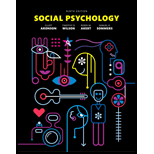
Introduction
Attitudes are the way people evaluate the world around them. Attitudes describe how someone feels about something (do they like it or dislike it?) and influence behaviors. The correct answer is option (c).
Explanation of Solution
Correct answer and explanation
Attitudes are not fully determined by our genetic makeup nor our environment. They can, however, be indirectly linked to genetics. Temperament and personality are aspects that are often genetically inherited. People develop similar attitudes to their parents, or other relatives, based on what they inherit. For example, they may have a similar like or dislike of a certain food. Social experiences that occur across the lifespan can later shape these attitudes, but attitudes also possess a genetic component.
Explanations for incorrect options
Option (a) states that attitudes “do not seem to have any genetic component.” However, research on twins shows that identical twins (twins with the same genetic makeup) share more attitudes than fraternal twins, even when raised in different environments. Therefore, there is a genetic component to attitudes. So, option (a) is incorrect.
Option (b) states that attitudes are strictly defined by our genetic makeup, with little impact by environmental factors. However, research by social psychologists has shown that social experiences, thoughts, and emotions can all shape attitudes. So, option (b) is incorrect.
Option (d) states that both fraternal and identical twins are likely to share similar attitudes. However, research has shown that identical twins are more likely to share attitudes than fraternal twins. So, option (d) is incorrect.
Therefore, the options (a), (b), and (d) are incorrect.
Want to see more full solutions like this?
Chapter 7 Solutions
Social Psychology (9th Edition)
- Explain how bilingualism, monolingualism, or trilingualism has affected you while using language in the Miami areaarrow_forwardDescribe the two models of language processingarrow_forward2. How would you compare the lives of poor people living in the low-income nations of the world with those in cities and rural areas of the United States? In what ways are their lives similar? In what ways are they different?arrow_forward
- discuss the critisism of functionslism theoryarrow_forwardHow have economic crises such as the Great Depression, the 2008–2009 recession, and the COVID-19 pandemic impacted families in both practical and emotional ways? How do these events continue to shape family life today? In what ways has the definition and structure of “family” evolved in the 21st century? How do these changes reflect broader shifts in societal values, gender roles, and legal recognition of diverse relationships? What are some of the major economic and social challenges facing families today, and how do these challenges differ across social class levels, particularly for working-class and middle-class families? How do you think the increasing visibility of same-sex families, domestic partnerships, and cohabitation without marriage will influence societal norms and policies around family in the coming decades? Given current trends, what do you envision family life will look like in the future—by 2030 or 2040? How might factors like technology, economic instability,…arrow_forwardYou have decided to study global wealth and poverty. How would you approach your study? What research methods would provide the best data for analysis? What might you find if you compared your research data with popular presentations—such as film and advertising—of everyday life in low- and middle-income countries?arrow_forward
- What are the PROs and CONs of the Guardian Mindset basd on mindsets in policing by Mike D'Antonio in a TEDx Talks presentation?arrow_forwardDiscuss one example of each of these… A time that someone gave you legitimate criticism that you could learn from. A time that someone gave unfair criticism which you should not be hurt by. A time that you criticized someone, perhaps accurately, but you delivered your criticism so harshly that the other person could not take it in. How could you have said it better?arrow_forwardprepare a written response which compares and contrast Zimbardo’s Theory of Individuation with Social Identity Theory.arrow_forward
 Social Psychology (10th Edition)SociologyISBN:9780134641287Author:Elliot Aronson, Timothy D. Wilson, Robin M. Akert, Samuel R. SommersPublisher:Pearson College Div
Social Psychology (10th Edition)SociologyISBN:9780134641287Author:Elliot Aronson, Timothy D. Wilson, Robin M. Akert, Samuel R. SommersPublisher:Pearson College Div Introduction to Sociology (Eleventh Edition)SociologyISBN:9780393639407Author:Deborah Carr, Anthony Giddens, Mitchell Duneier, Richard P. AppelbaumPublisher:W. W. Norton & Company
Introduction to Sociology (Eleventh Edition)SociologyISBN:9780393639407Author:Deborah Carr, Anthony Giddens, Mitchell Duneier, Richard P. AppelbaumPublisher:W. W. Norton & Company The Basics of Social Research (MindTap Course Lis...SociologyISBN:9781305503076Author:Earl R. BabbiePublisher:Cengage Learning
The Basics of Social Research (MindTap Course Lis...SociologyISBN:9781305503076Author:Earl R. BabbiePublisher:Cengage Learning Criminalistics: An Introduction to Forensic Scien...SociologyISBN:9780134477596Author:Saferstein, RichardPublisher:PEARSON
Criminalistics: An Introduction to Forensic Scien...SociologyISBN:9780134477596Author:Saferstein, RichardPublisher:PEARSON Sociology: A Down-to-Earth Approach (13th Edition)SociologyISBN:9780134205571Author:James M. HenslinPublisher:PEARSON
Sociology: A Down-to-Earth Approach (13th Edition)SociologyISBN:9780134205571Author:James M. HenslinPublisher:PEARSON Society: The Basics (14th Edition)SociologyISBN:9780134206325Author:John J. MacionisPublisher:PEARSON
Society: The Basics (14th Edition)SociologyISBN:9780134206325Author:John J. MacionisPublisher:PEARSON





